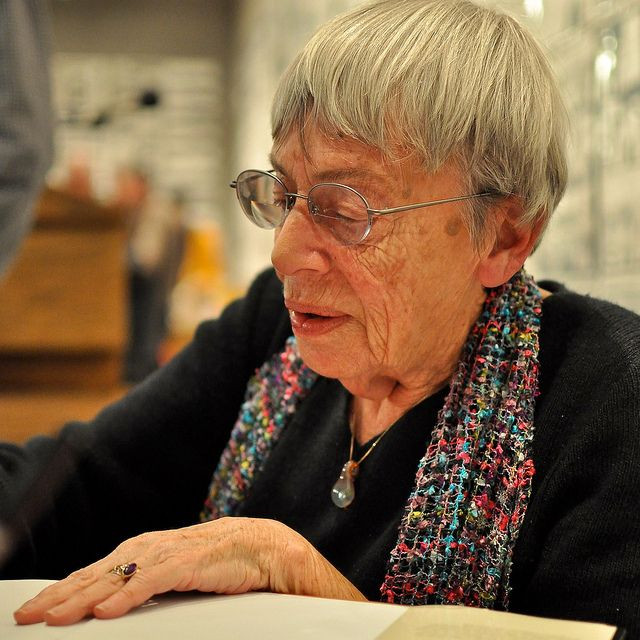Ursula K. Le Guin, Grand Master of science fiction, author of A Wizard of Earthsea, The Left Hand of Darkness, The Dispossessed, The Word for World is Forest, The Lathe of Heaven, short fiction, poetry and essays, died Monday at home in Portland, Ore. at the age of 88. In a world short of utopians, she was among our best. Every sentence of Le Guin’s aimed at a better future for her species. And let’s never forget: she came to change minds.
“Ursula K. Le Guin, the immensely popular author who brought literary depth and a tough-minded feminine sensibility to science fiction and fantasy, is dead at 88,” read the New York Times Obituaries description. Readers objected to the use of the word “feminine” instead of “feminist," so The New York Times changed the wording to "feminist" in the obituary and subsequent social posts. “Feminist”: ideological, associated with specific politics, an affront to some. “Feminine”: traditional, generically descriptive, empty of doctrine.
The Times’ word-choice error was minor, and promptly fixed, but it’s just the beginning of the smoothing process artists undergo after they’re no longer here to insist on their ideas. These are the changes that will, word-by-word, shape Le Guin into a grandmotherly figure, empty her of argument and put her on posterity’s shelf to be read for her influence on subsequent generations.

Gods look down from above and smile with beatific grace, smile upon any interpretation people would care to make of them. But Le Guin could only become such a figure by the destruction of her intent. The toxic coalition of civility and ideological sabotage works like an acid bath, erasing features until the original form is generic enough to be propped up by anyone.
It always begins with gentle sanding, with the finest grain. Look again to The New York Times obituary and how they describe Le Guin’s utopian masterpiece, The Dispossessed:
“The Dispossessed contrasts two forms of social organization: a messy but vibrant capitalist society, which oppresses its underclass, and a classless “utopia” (partly based on the ideas of the Russian anarchist Peter Kropotkin), which turns out to be oppressive in its own conformist way. Ms. Le Guin leaves it up to the reader to find a comfortable balance between the two.”
This is only true in the most banal and empty sense: that each reader gets to decide everything for themselves. I could decide, for example, that in Star Wars the Empire is right. Or I could be more reasonable and find a comfortable balance between the two. But there’d be no mistaking my interpretation for the text’s intent. And while Le Guin’s worlds are less binary than those of Star Wars and far more open to ambiguity, there’s no honest reading of The Dispossessed that can arrive at the “both sides” conclusion reached here.
The capitalist Urras is a horror planet, its society a cruel abomination (and just like ours). It’s true that the anarchistic Anarres of The Dispossessed is an “ambiguous” utopia, but not because it needs to strike a balance with Urras’ capitalism. Instead, Le Guin demonstrates utopia must be constantly re-won and fought for, that there will be no end-state where humanity settles into bliss. The generations after the separatist revolution slump into selfish and controlling habits, the solution for which isn’t more capitalism, according to Le Guin — it’s more anarchism. The revolution must refresh itself, must create itself anew in each individual: “Revolution is our obligation: our hope of evolution. ‘The Revolution is in the individual spirit, or it is nowhere. It is for all, or it is nothing. If it is seen as having any end, it will never truly begin.’”
A revolutionary (in her writing and spirit: Le Guin wryly told Literary Hub “I am a bourgeois housewife, I don’t practice anarchism”) of politics, gender and art, Le Guin never looked for accommodation with the status quo. In her 2014 speech accepting the National Book Foundation’s Medal for Distinguished Contribution to American Letters, Le Guin said, “I think hard times are coming when we’ll be wanting the voices of writers who can see alternatives to how we live now and can see through our fear-stricken society and its obsessive technologies to other ways of being and even imagine some real grounds for hope. We will need writers who can remember freedom.”
Don’t damn Le Guin to deification — her writing is more rowdy, radical, vibrant and necessary than ever. And unlike any god, her faith continued to be in humans and their capacity for defining their own future. She wrote, and lived, in fundamental opposition to the pervasive belief that we are subordinate to systems and processes beyond our control, doomed to the inevitable logic of economy or technology. “We live in capitalism, its power seems inescapable — but then, so did the divine right of kings. Any human power can be resisted and changed by human beings,” Le Guin said in the same speech. That is the utopian essence that must not ever be lost, must never be flattened or compromised if we’re to achieve the miracles Le Guin wanted for us: we can change our world.


















